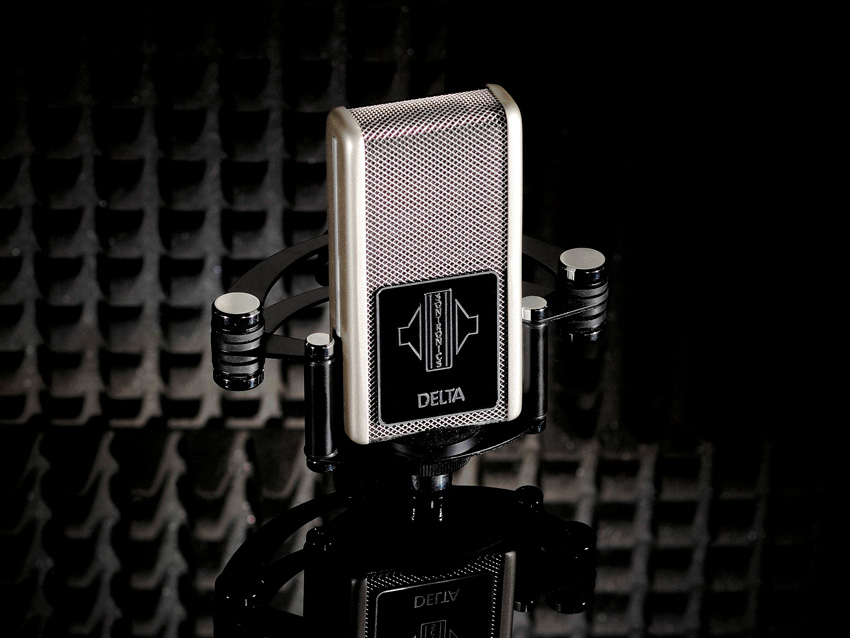MusicRadar Verdict
Excellent for guitar amps - quick and easy to use while delivering a beautifully balanced sound.
Pros
- +
Delivers excellent guitar amp sound. Easy to use. Rugged build.
Cons
- -
Not an all-rounder.
MusicRadar's got your back
Sontronics' existing Phantom-powered ribbon mics - the Sigma and Apollo - have cemented the company's deserved reputation for well-designed and reliable mics that combine a traditional ribbon sound with the benefits of active electronics.
So it should come as no surprise that its latest offering, the Delta, follows suit and looks set to build on this heritage.
Overview
Shorter and fatter than the Sigma, the Delta is designed to be more rugged and up to regular use in a live environment. Reading Sontronics' press release it's clear they have that ribbon favourite guitar amplifiers firmly in their sight. But to be fair, any instrument with complex high frequency content (drum kits and brass spring to mind) can benefit from the smoothness of a ribbon mic.
So, aside from the size and shape, what else marks the Delta out from its sibling? Basic specs such as figure-8 pattern and noise figures (14dB) are similar, and you get the same type of suspension cradle.
Mics are individually serial-numbered, although for the Delta this is a sticker on the underside, rather than an etched faceplate like the Sigma, which is a shame. At £499, its price is also similar to that of the Sigma. But beyond these points, the Delta is definitely a different beast with slightly lower sensitivity (11mV/Pa) and a quite different frequency plot.
On test
Clearly, our first test had to be an electric guitar amp. With the Delta in close at a few inches and centred on the speaker cone, the sound is brilliantly rounded and balanced with plenty of proximity and none of the pokiness you tend to get from dynamic mics.
Obviously, the higher top end is restrained, and this may not be ideal for all applications. What's more, although the plot indicates a slight mid-range lift at 2kHz, this isn't obvious to us. However, in typical ribbon mic style, you can add plenty of top end EQ without things sounding too processed.
Want all the hottest music and gear news, reviews, deals, features and more, direct to your inbox? Sign up here.
Although ribbon mics have theoretical figure-8 patterns, the front and back do tend to sound slightly different. Sticking with the guitar amp and flipping the Delta round produced a slightly brighter sound, although the differences were subtle.
Moving on to some other sounds, the Delta easily delivers a warm, radio-friendly speech tone. It also does a good job of rounding off the edges for hand-held percussion such as shakers and tambourines.
Peering through the mic grille, it's obvious there's an extra layer of protection compared with the Sigma, and the ribbon assembly (or motor as it's known) is not visible. This may have been done to add wind protection or modify the frequency response… either way, with any plosive or air-shifting source, speech and vocals especially, the Delta still benefits from a standard pop shield.
Summary
Clearly, the Sontronics Delta sets out to deliver silky smooth electric guitar sounds with a retro flavour, and in that respect it really delivers. What we didn't expect was how easy it would be to achieve this.
Positioning on a guitar amp is quick and simple, making it an instantly rewarding mic. And if you want some extra top end, it responds well to EQ.
Even so, like all ribbon mics it's not what you'd consider an all-rounder, so it should be purchased to complement the condensers and dynamics in your mic collection rather than replace them.
Future Music is the number one magazine for today's producers. Packed with technique and technology we'll help you make great new music. All-access artist interviews, in-depth gear reviews, essential production tutorials and much more. Every marvellous monthly edition features reliable reviews of the latest and greatest hardware and software technology and techniques, unparalleled advice, in-depth interviews, sensational free samples and so much more to improve the experience and outcome of your music-making.

